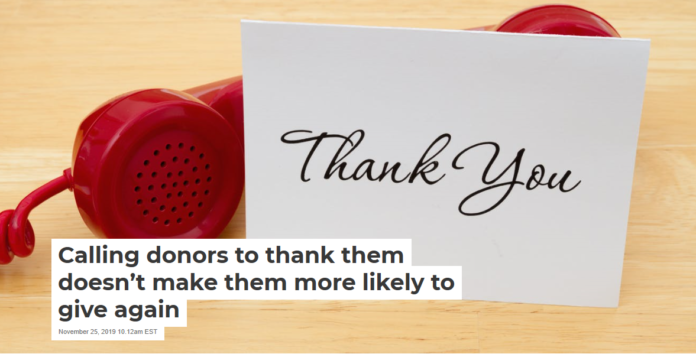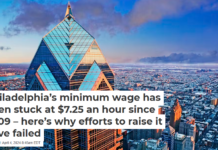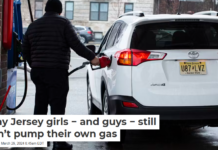
Anya Samek, University of Southern California – Dornsife College of Letters, Arts and Sciences
Donors gave US$380 million to nonprofits during 2018’s Giving Tuesday donation drive.
Many of the groups getting donations like those follow up by calling donors to thank them, leaving a voicemail if nobody picks up the phone.
I’m a behavioral economist, and I study the effectiveness of fundraising practices. I wanted to see if these calls made people more likely to support a charity again.
Half a million
To find out, I teamed up with Chuck Longfield, who recently retired from a cloud software company that has many nonprofit clients.
For our study, we partnered with nearly 70 public television stations and one large national nonprofit. They sent us lists of half a million new donors from 2011 through 2016. The average size of a first donation was $150 for the public TV stations and $70 for the nonprofit.
We randomly assigned some of the donors to get thank-you calls – which can cost the charities about $1 each to outsource. The rest didn’t get calls.
The calls were personal, emphasized the impact of the gift and didn’t ask for another donation.
Believe what I do, not what I say I do
Google “thank-you call” and you’ll get over 50 million results, including loads of advice about how to make them more likely to keep donors on board.
The evidence offered is largely anecdotal. This makes sense to me, because I often encounter fundraisers who say something like, “We know calls work, because when I called to thank Ruth she said she appreciated the call and wanted to give again.”
Sometimes, nonprofits pose this question to their donors – most of whom say the thank-you calls can make a big difference.
The problem is that what people say often doesn’t match what they do. That applies in many situations, including charitable giving.
Of the several hundred nonprofits I’ve surveyed, 80% said they make thank you calls at least some of the time.
One big reason for the calls is to encourage donors, especially new ones, to give again. Fewer than half of all donors do that.
We also surveyed fundraising experts and the general public about what they believe should be the impact of thank-you calls as we conducted them. Both groups believed that thank-you calls would increase the probability that someone would donate again within 12 months by 50%.
Why bother?
As the data rolled in, we began to see a pattern that surprised us. Making thank-you calls made no difference at all.
About 28% of the donors to the public TV stations who got thank you calls gave to the same charity within the next year. And 28% of the donors who didn’t get the calls did as well.
Likewise, about 31% of the donors to the national nonprofit gave to that group again, whether or not someone called to thank them for their first donation.
We had a few more findings that strike us as significant. For example, the size of a donor’s future donation did not change based on whether someone thanked them for supporting a charity.
What’s more, we determined that these calls made no difference not just for the next year but for the next five years following the study.
No secret agenda
Based on the initial responses I’ve been getting from an academic paper we published on this study, I want to be clear that I wasn’t out to get the fundraising industry.
My initial hypothesis, based on theories from behavioral economics and the prevalence of these calls, was that thank-you calls would work. I was excited about having a chance to measure their effectiveness.
But I have to report what the data says. And it says that routine thank-you calls to donors don’t help with nonprofit fundraising.
At the same time, charities might wish to make calls out of a belief that making them is the right thing to do. In that case, I can see a rationale for them to stick with this tradition.
[ You’re smart and curious about the world. So are The Conversation’s authors and editors. You can read us daily by subscribing to our newsletter. ]![]()
Anya Samek, Associate Professor (Research) of Economics, University of Southern California – Dornsife College of Letters, Arts and Sciences
This article is republished from The Conversation under a Creative Commons license. Read the original article.




















